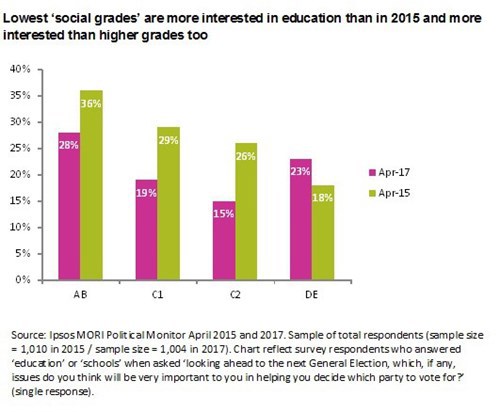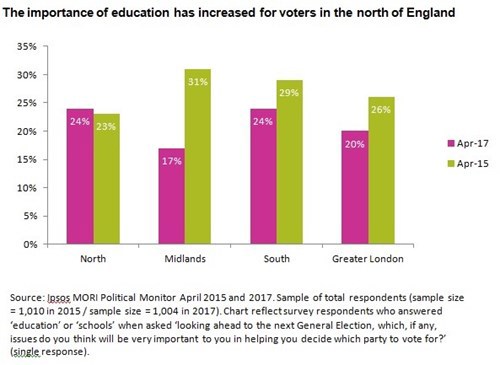Who’s interested in education?
Friday 28 April 2017
One of the challenges of working in the education sector, is everyone has an opinion because everyone has been to school. Whilst this can be unhelpful in some contexts, it should be a real strength during a general election campaign. Yet, for nearly 20 years, education has not been a priority issue for politicians or the electorate. In 1997, nearly half the population thought that education was the most important issue facing Britain. Since 2007, this figure has been less than a quarter.
During the 2015 election campaign, my colleague Ben Durbin wrote a blog bemoaning a lack of interest in education. It was left to the education sector to highlight the important issues, and perhaps we didn’t do it well enough because just two years later we risk being in the same position.
In April 2017, Ipsos Mori asked a representative sample of 1,010 adults aged over 18 across Great Britain:

‘looking ahead to the next General Election, which, if any, issues do you think will be very important to you in helping you decide which party to vote for?’.
Twenty-one percent of their sample responded education or schools. In 2015 it was 27 per cent. This is a single-response open question, i.e. people being polled get to say just one thing. As you would expect, the issues that people mention vary significantly (in 2015 the top two issues were healthcare/NHS and the economy, in 2017 they were Brexit and healthcare/NHS), interestingly though, in terms of rankings, education came third in both polls.
Looking deeper into this data, the numbers become quite small and need to be treated with caution. But there are some potential trends; in both the 2015 and 2017 polls, education is more important to women than men, and to adults of child-rearing age (compared to than those aged 55 and over).
There are also one or two surprises in the 2017 data…
Traditionally, education has been less important to those on a lower ‘social grade’. Data from the 2015 election supports this. However, the latest polling shows an unusual change.

This change must be treated with caution. The numbers are small in this type of polling and whilst they are weighted to be nationally representative, we are only looking at a small number of respondents in each group. Clearly small numbers can skew results. Ideally we need more data, but in the absence of corroborating evidence we should greet this development with cautious optimism.
If accurate, an increased interest could relate to the increased focus that this group have received since the pupil premium was introduced in 2011. It is, however, still less than a quarter of the group so whilst interest may be increasing it is perhaps not piqued enough to make a difference in this campaign period.
There is also an interesting regional picture emerging. Noting the same sample size caveats listed above, it appears that interest in education has fallen in importance in all regions except the north of England.

Disparities in education provision across the country have been noted for some time. The gap between the North and the rest of the country were a feature of Ofsted’s most recent Annual Report. Regional variations were also highlighted in NFER’s latest analysis of Regional Schools Commissioner areas. Dissatisfaction may now be coming through from the electorate too.
Education is not short of big issues at the moment; school funding, teacher recruitment and retention, and the skills needed in a post-Brexit Britain are all ripe for debate. Today NFER is launching its election website. We will be working with the UK’s independent fact checking charity, Full Fact to ensure the accuracy of any educational evidence used in campaigning. We will also be providing regular policy updates, analyses and latest news on education and related issues for the UK 2017 General Election.
Let’s just hope people are more interested this time.

